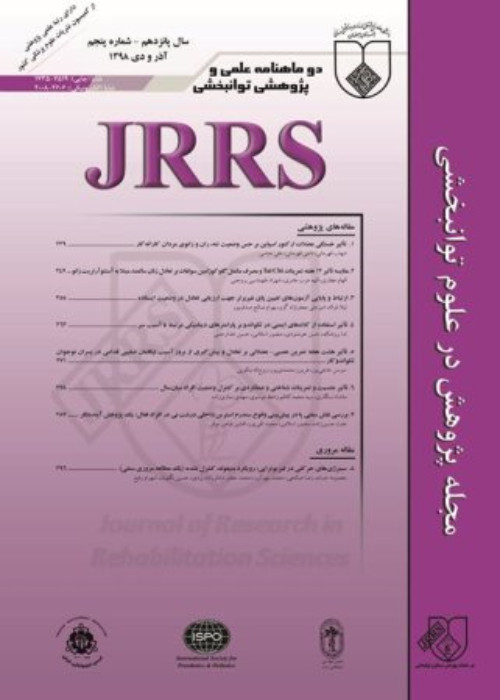The effectiveness of token economy and social reinforcements on the academic achievement of students with intellectual disabilities and normal students
Author(s):
Abstract:
Background
Although there is now a large body of data demonstrating the effectiveness of reinforcements in behavior modification, there have been few studies on the effectiveness of token economy and social reinforcements for academic achievement in female students with intellectual disabilities. Since these kinds of reinforcements can lead to enhanced interest and motive for learning, planning for their implementation is of particular importance. The aim of this study was to compare the effect of token economy and social reinforcements on the academic achievement of students with intellectual disabilities. Materials And Methods
The present research was an experimental study (pre-test, post-test and control group). Participants in this study were 45 girls with intellectual disabilities attending 9th grade of special education. This sample was recruited by multi-stage cluster method from special education schools of Tehran Province. Participants were divided into three groups (two experimental groups and a control group) each of which was consisted of 15 students. The Wechsler test of intelligence and a teacher-made test were respectively used for matching the groups in terms of IQ and for measuring the academic achievement of subjects in Science lessons. The obtained data were statistically analyzed by one-way ANOVA and Post-Hoc Scheffe using SPSS software.Results
The post-test mean score for token economy, social reinforcement and control groups were respectively as follows: 17.5 (SD=0.87), 14.48 (SD=1.13), 13.23 (SD=1.23). There was a significant difference between mean achievements scores of these three groups (F(2,42)=57.03, P<0.001). Post-Hoc Scheffe showed that mean difference of scores in token economy group was greater than both of social reinforcement’s (3.02, P<0.001) and control’s mean scores (4.10, P<0.001). It also showed that mean difference of scores in social reinforcement group was significantly greater than those of control group (1.08, P<0.04).Conclusion
Token economy reinforcements are more effective than social and control reinforcements on the academic achievement of female students with intellectual disabilities. Social reinforcement for academic achievement was more effective than providing no reinforcement in these students. Therefore, token economy reinforcement is one of the best programs for academic achievement in students with intellectual disabilities.Language:
Persian
Published:
Journal of Research in Rehabilitation Sciences, Volume:7 Issue: 3, 2012
Page:
284
magiran.com/p959629
دانلود و مطالعه متن این مقاله با یکی از روشهای زیر امکان پذیر است:
اشتراک شخصی
با عضویت و پرداخت آنلاین حق اشتراک یکساله به مبلغ 1,390,000ريال میتوانید 70 عنوان مطلب دانلود کنید!
اشتراک سازمانی
به کتابخانه دانشگاه یا محل کار خود پیشنهاد کنید تا اشتراک سازمانی این پایگاه را برای دسترسی نامحدود همه کاربران به متن مطالب تهیه نمایند!
توجه!
- حق عضویت دریافتی صرف حمایت از نشریات عضو و نگهداری، تکمیل و توسعه مگیران میشود.
- پرداخت حق اشتراک و دانلود مقالات اجازه بازنشر آن در سایر رسانههای چاپی و دیجیتال را به کاربر نمیدهد.
In order to view content subscription is required
Personal subscription
Subscribe magiran.com for 70 € euros via PayPal and download 70 articles during a year.
Organization subscription
Please contact us to subscribe your university or library for unlimited access!


